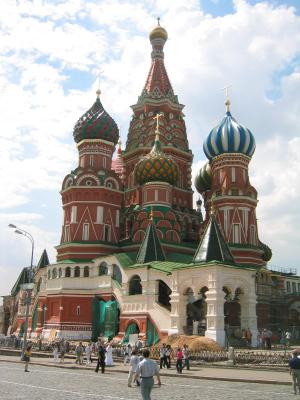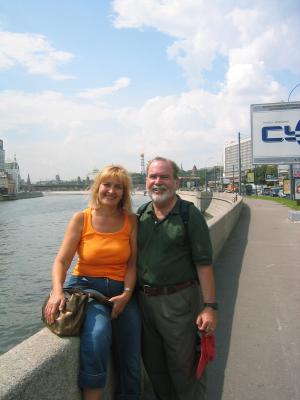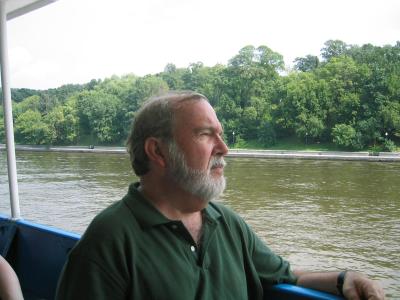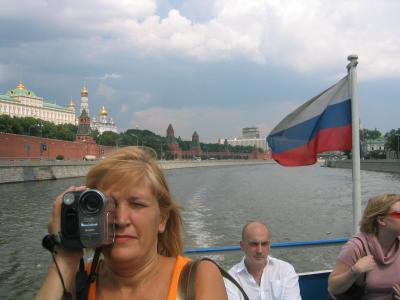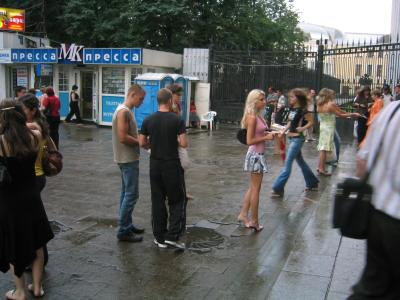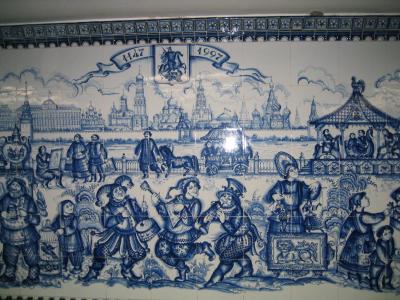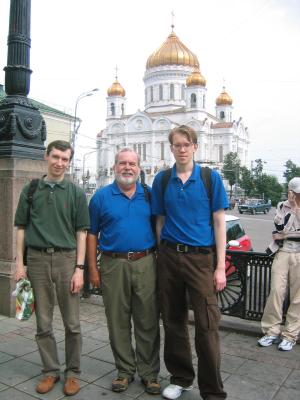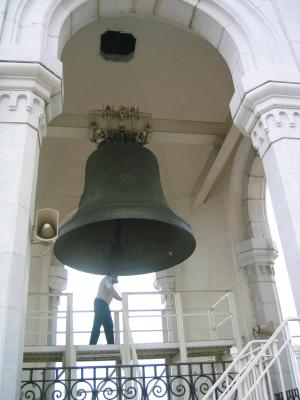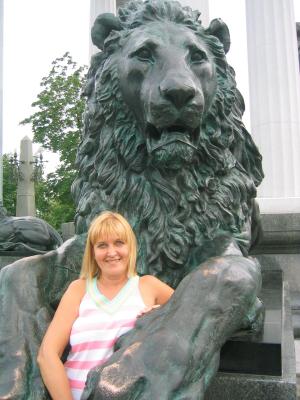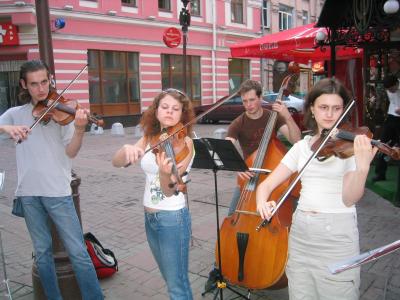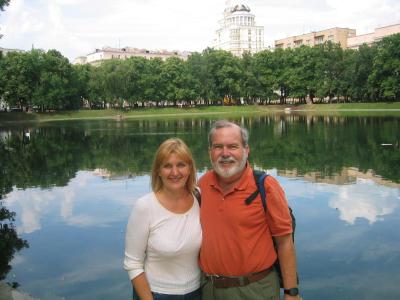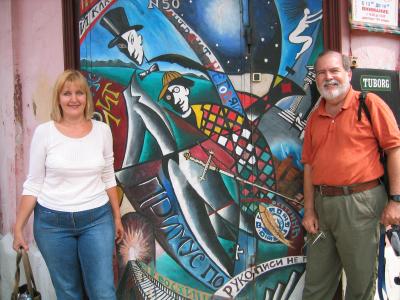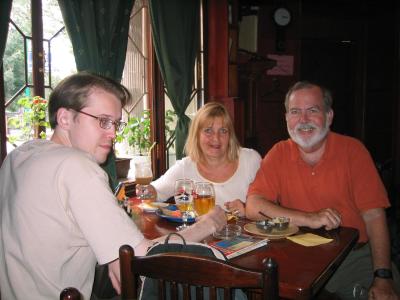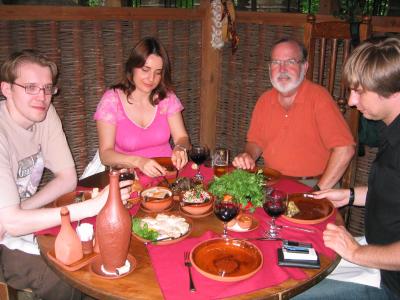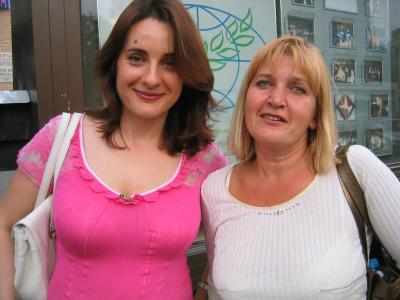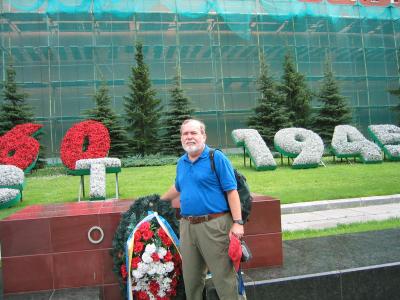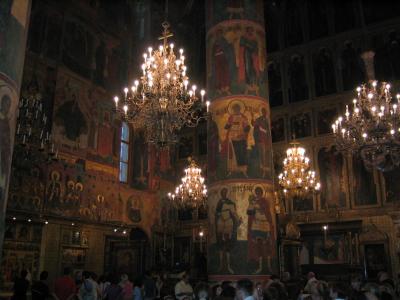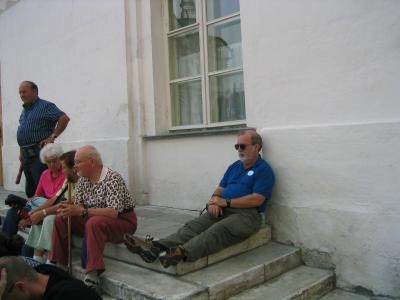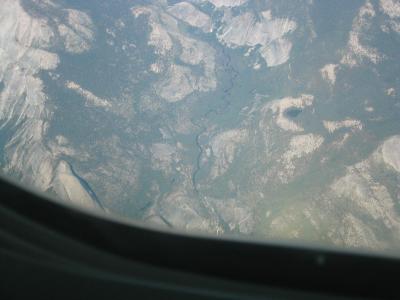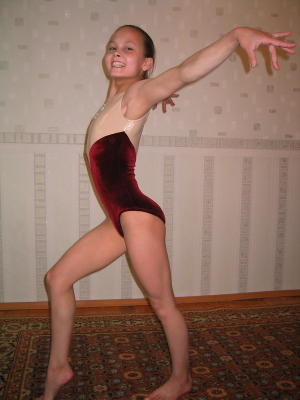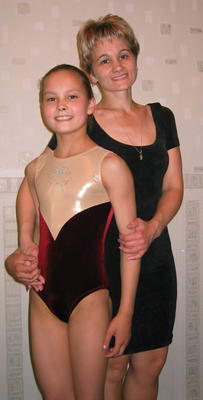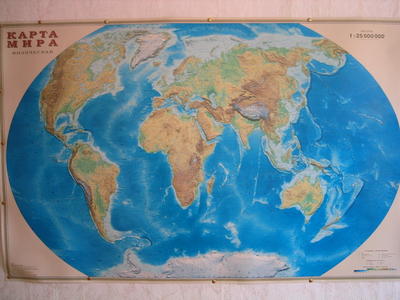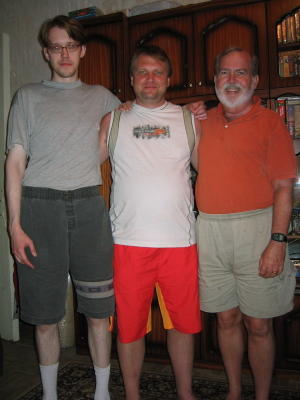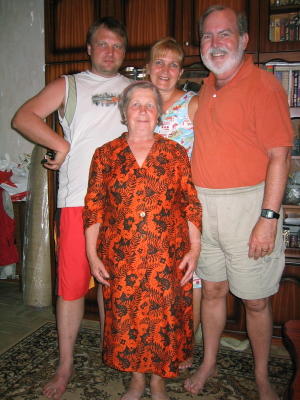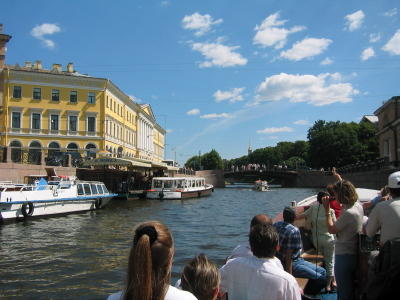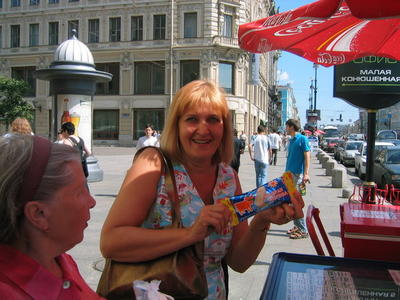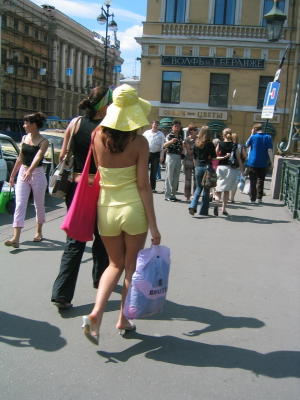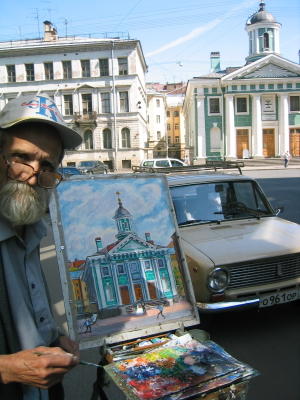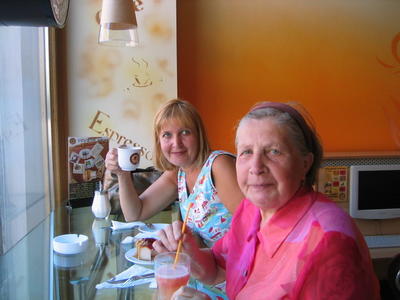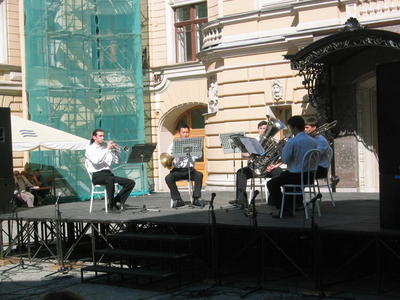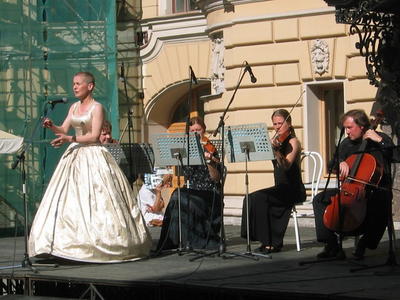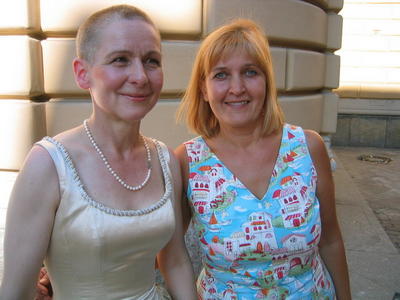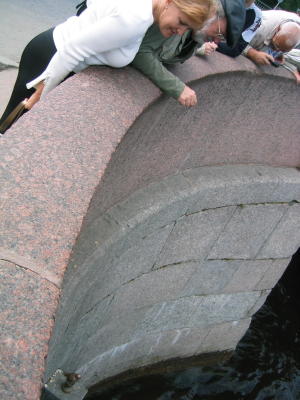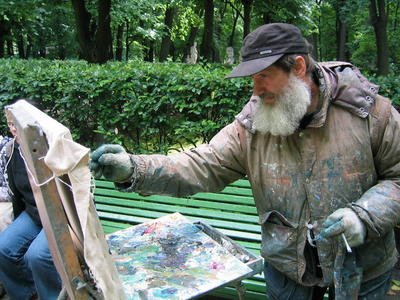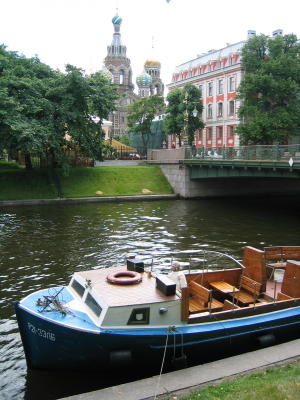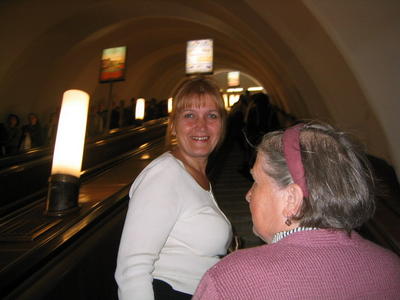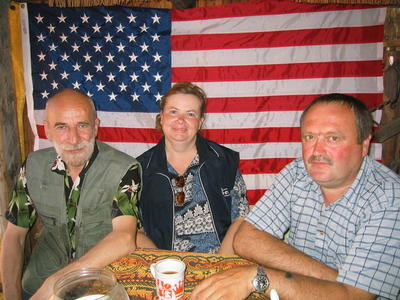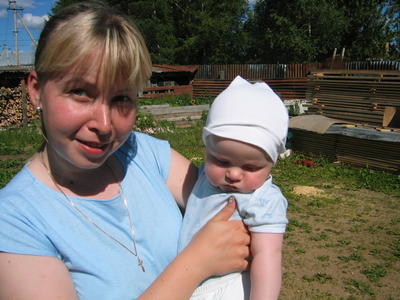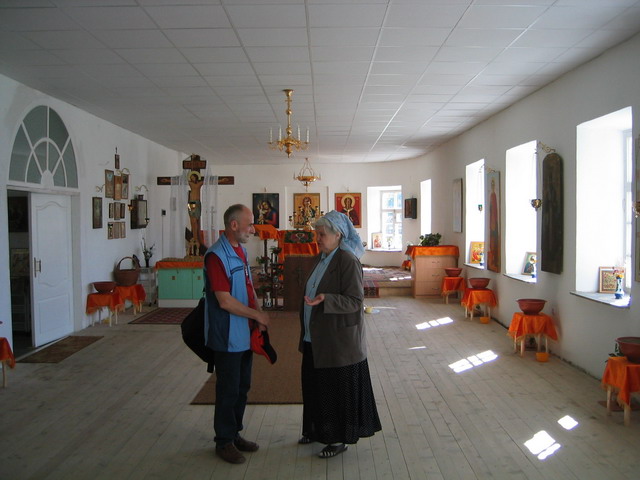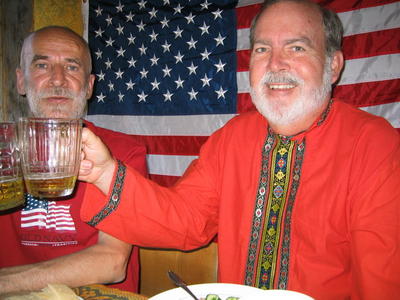Our host in Moscow was Roman Vlasov; he prefers to be called Roma. I met him in Odessa, Ukraine, in 1989, when he was a student learning English. We have corresponded and visited each other since then. In 1995 he was able to come to the States for a visit. Now he works as a foreign service national at the Help Desk at the American Embassy in Moscow assisting the large staff with computer problems and other technical concerns. Roma speaks fluent English and is always a fascinating conversationalist. For many years he has been a devoted fan of the Beatles and has even made a pilgrimage to Liverpool, England. He attended Paul McCartney's first concert in Russia, in Red Square, in 2003. Lately he has added two new interests to his life: tennis and theater. He plays tennis and is a avid supporter of the Russian tennis team. He frequently attends theatrical performances and lately has begun attending a theater club to learn about acting.
Last Saturday Roma took me with him to the hugh indoor Olympic Stadium where we watched most of a quarter final doubles match between France and Russia. We saw former Russian President Boris Yeltzen in the stands to our right; Roma told me that he attends all Russia's matches. I had an impulse to go over and ask him some questions: President Yeltzen, "Do you think the life of the average Russian has improved since you left office?" I could think of a lot of questions to ask him, but I restrained my impulse.
In 2000 Roma and I had been to the renactment of the important Battle of Boridino, part of the war of 1812 between Nepoleon's forces and Russia. In a one day battle the Russians lost 40,000 men and the French 30,000. Although Napoleon was able to go on to invade Moscow, he considered Borodino the "most terrible" of all his battles. Roma and I joked that is much better to see Russia and France battling on the tennis court than on the fields of Borodino.
We had to leave the match early to meet Tanya and Svyatoslav. Roma was disheartened that Russia lost the doubles match and explained that they would have to win both matches on Sunday to prevail. Their chances did not look good.
The four of us went the the Cathedral of Christ the Savior. Like so many things in Russia it has a rich and dramatic history. The hugh church with room for ten thousand worshipers was built to honor Russia's victory over Napoleon. In 1931 Stalin ordered it to be destroyed to make way for a grandiose Palace of Soviets. The Palace of the Soviets was never completed and for a long time the site of the church was a large public swimming pool. After the fall of the Soviet Union, with contributions from millions of Russians, rich and poor, as well as the city government of Moscow, the Cathedral was rebuilt as it was originally. It is vast and beautiful and inspiring.
At the Cathedral we met Vasia and his wife Luda who are icon painters. They took us up an elevator to their spacious studio high up in the Cathedral. They showed us how they work with the most contemporary technology (computers and scanners) and the most ancient implements (brushes, tempura and gold) to make beautiful icons. Outside the arched window of their studio we could look down on the Kremlin not far away.
After tea Vasia took us up a flight of steps to an open area where we could walk around and see a panoramic view of Moscow stretching to the horizon in all directions. While we were enjoying the view, men began to ring the church bells. One bell was probably over ten feet high and the ringer had to swing the large clapper back and forth several times before it finally hit the side of the bell with a very loud and deep bong.
When we left the cathedral Roma had to go off to do and errand and I guided the tourists to the Kish Mish Restaurant on New Arbat Street where we enjoyed a wonderful Uzbecki meal (skewers of lamb, rice pilaf, tasty frest-baked flat bread).
On Sunday we all went to the Tolstoy House Museum. Since Roma and I had both visited inside before, we sat outside in the garden on a little hill while Tanya and her son went inside. We later learned from a very informative woman at the ticket office that Tolstoy had bought the house because he liked the large garden in back and built the little hill as a place for his many children to sled in the winter.
While Roma went off to meet with his theater club, the rest of us made our way to Patriarch's Pools, a place made famous by Michael Bulgakov's famous novel, Master and Margareta. The Ponds now are a very quiet place like an oasis in the hugh megalopolis. We dropped into Margarita's Cafe for a light snack.
Later in the evening, my dear old friends Max and Yana, came in their car and took us to a wonderful Caucasis restaurant with a large patio that looked like it could be a Mexican restaurant in Southern California. Max and Yana love to travel and told of us of their recent trip to Italy which they enjoyed very much.
Monday was very warm and muggy as we set out to visit the Kremlin. On the way we strolled through the new Menezhnia Square "mall" and the Alexander Garden next to the Kremlin wall. There is an eternal flame guarded by military honor guards. We saw a display of flowers commemorating the 60th anniversary of Victory Day, May 9th, 1945, the day Russia defeated Germany (with a little help from some other nations).
As we neared the main public entrance to the Kremlin (which means "fortress" in Russian) a short, bright-eyed woman introduced herself asking if we needed a guide to the Kremlin. She said that she could give a tour in Russian, English or Italian and agreed that she would talk mostly in Russian, but with some English for me. She promised to help us expedite getting tickets and be our tour guide inside for an hour and a half including the interiors of three of the five ancient churches (formerly used by the Tsars). Her fee seemed reasonable so we agreed. The guide introduced herself as Lubov (a fairly common Russian name which means "Love"). So with Love as our guide we toured the Kremlin, the heart of this city which is over 850 years old.
In one church she said that Nepolian had entered it on horseback and had turned it into a stable for horses. I hadn't realized that Nepoleon was such an evil tyrant who was so disrespectful of Russia, its people and religion. (Moscovites burned their city down rather than to yield to Napoleon and he had to flee in disgrace back to France.) My visit was much more successful than his.
After the tour of the interior of the third church I was suffering an overdose of icons and sat and rested while my fellow-tourists explored the interiors of two more churches.
On the way back to Roma's apartment we were tired, hungry and thirsty. I proposed going to a nearby MacDonalds which I knew would be air conditioned and have reliable, inexpensive food. But since my wife doesn't like MacDonalds at all we went on looking in vain for a restaurant on which we could agree. Finally we gave up and went back to Roma's to eat. He came home and cheered us up with the news that Russia had won both singles matches that day which meant an overall victory for Russia over France (like a peaceful version of the War of 1812). Roma also gave us the good news that another old friend, Misha, had agreed to take us to the airport the next day so we didn't need a taxi. During our late evening conversation Roma said that going to America (where he stayed for about five months) was like going to visit the future.
So on a rainy Tuesday morning, my last day on this trip to Russia, Misha showed up with his car to begin the process of getting me "back to the future". Misha is a unique person, perhaps 40 years old with a wife and family of six beautiful children. He works as a computer consultant and is a devout Russian Orthodox Christian. He was very patient driving through the rain and stop-and-go traffic for two hours to get us to the airport. There I said goodby to Tanya and Svyatoslav. Tanya will remain in Russia for another month.
I went throug the normal ordel of X-rays, baggage checks, passport control and was frazzled by the time I finally boarded the airplane. A kindly stewdardess immediately spoke to me (in Russian) and calmed me down and even later found me a better seat by myelf next to a window. Over thirteen hours later (including 12 hours and 23 minutes in the air) I was back in Los Angeles. Some good Russian friends, Eugene and Ria, met me and drove me home. That evening, still lusting after American junk food, I drove to MacDonald's and enloyed the decadence of a Big Mac with large fries!
Now I am trying to adjust to this strange land of empty sidewalks, early sunsets and funny green money. Monday I'll return to the obscurity of my five by seven foot cubicle to perform my public service knowing that my life has been immeasurable enriched and altered by all the beautiful people and marvelous places I encountered on this memorable trip.
Thursday, July 21, 2005
Red Square
Sunday, July 17, 2005
Brief Highlights from Moscow
Before my host's internet time runs out here a are a few brief highlights of our visit to Moscow. Yesterday, while Tanya and her son went to an art gallery, Roma and I went to a Davis Cup match and watched most of a doubles match between France and Russia. Boris Yeltsen was in the crowd looking happy to be a private citizen. All of visited us a married couple who are friends of Roma who paint icons in a studio high up in the hugh Cathedral of Christ the Saviour with a magnificant view of the city. It is a place where tourists do not get to visit!
Today we visited the museum/home of Leo Tolstoy and the Patriarch Ponds made famous by author M. Bulgakov in his book Master and Margarita. This evening we had a wounderful, big meal in a Kavkas restaurant with dear old friends. Photos and details to follow.
Today we visited the museum/home of Leo Tolstoy and the Patriarch Ponds made famous by author M. Bulgakov in his book Master and Margarita. This evening we had a wounderful, big meal in a Kavkas restaurant with dear old friends. Photos and details to follow.
Saturday, July 16, 2005
Moscow
We arrived in Moscow yesterday morning, July 15th, at 5:30 and are staying with my friend, Roma.
While Roma worked yesterday, Tanya, Svyatoslav and I toured the city: Red Square, St. Basil's Cathedral (including a tour of the inside)a boat ride on the Moscow River, a stroll through old Arbat Street, a meal in the Shamrock Bar. The weather was hot and humid. Millions of people were in the streets and metros. We saw no less than 20 wedding parties entering Red Square almost in a procession.
Just as we were trying to figure out where to turn to get a tram or bus after emerging from the metro nearest to Roma's apartment, he appeared! A wonderful coincidence. Later in the evening Roma and I remanised about his visit to California 10 years ago. Today we plan to attend a Davis Cup Match and go to a theatrical performance.
I'm having a great time but look forward to returning to California.
While Roma worked yesterday, Tanya, Svyatoslav and I toured the city: Red Square, St. Basil's Cathedral (including a tour of the inside)a boat ride on the Moscow River, a stroll through old Arbat Street, a meal in the Shamrock Bar. The weather was hot and humid. Millions of people were in the streets and metros. We saw no less than 20 wedding parties entering Red Square almost in a procession.
Just as we were trying to figure out where to turn to get a tram or bus after emerging from the metro nearest to Roma's apartment, he appeared! A wonderful coincidence. Later in the evening Roma and I remanised about his visit to California 10 years ago. Today we plan to attend a Davis Cup Match and go to a theatrical performance.
I'm having a great time but look forward to returning to California.
Tuesday, July 12, 2005
Highlights
Here are a few highlights from the last few days. Sunday we visited Irena Popovich and her daughter, Genia. Irena is the current director of the youth center where Tanya was formerly the director. Genia is an accomplished gymnast with many medals in her collection although she is only thirteen years old. All four of us visited their apartment on a hot day. Genia showed us videos of her performance last November in Belgium where she won a third place medal. She also showed her new computer and a Harry Potter game.
Sunday evening Tanya’s brother, Sasha dropped by for a visit. He volunteered to take us to the train station Thursday for our trip to Moscow.
Yesterday, while Tanya and her son went to the movie “World of the Worlds”, I went off by myself to see the Peter Paul Fortress on Hare Island, the island on which Peter the Great founded the city in 1703. Tour groups from a variety of countries were visiting the Fortress and the Peter Paul Cathedral where most of the Romanovs starting with Peter the Great are buried. On the shores of the island many locals were sunbathing. I walked across two bridges, saw more bridal parties, transversed Palace Square, went through the courtyards of the Kapella, ate a blin, strolled up Nevsky Prospekt, paused to inspect paintings displayed on the street, and finally took the metro home.
Here are a few more photos:
Sunday evening Tanya’s brother, Sasha dropped by for a visit. He volunteered to take us to the train station Thursday for our trip to Moscow.
Yesterday, while Tanya and her son went to the movie “World of the Worlds”, I went off by myself to see the Peter Paul Fortress on Hare Island, the island on which Peter the Great founded the city in 1703. Tour groups from a variety of countries were visiting the Fortress and the Peter Paul Cathedral where most of the Romanovs starting with Peter the Great are buried. On the shores of the island many locals were sunbathing. I walked across two bridges, saw more bridal parties, transversed Palace Square, went through the courtyards of the Kapella, ate a blin, strolled up Nevsky Prospekt, paused to inspect paintings displayed on the street, and finally took the metro home.
Here are a few more photos:
Sunday, July 10, 2005
A Beautiful Day in St. Petersburg
Yesterday was sunny and warm here in St. Petersburg, a beautiful day. All four of us went for a ride on a boat through the rivers and canals of the city. I had never seen so many boats on the St. Petersburg waterways. With the movement of the boat making a slight breeze, the weather was just ideal. Like most such boat excursions there was a guide who gave a running commentary in Russian. Our guide was animated and spoke distinctly so I was able to understand most of what she said. I used my video camera and digital camera almost simultaneously often taking pictures upside down (knowing I could turn the picture right side up later.)
At the conclusion of the boat ride we went briefly in the Kazan Cathedral and then strolled down Nevsky Prospekt to Palace Square in front of the Hermitage Museum. We were hungry by this time and decided to go to a nearby kiosk for blini. On the way we walked through the courtyards of the Kapella building. My guidebook says that the building was home of the Imperial Court Choir established by Peter the Great. Now it appears to be a music school. While Tanya was asking about the time of a jazz performance in a restaurant, I saw a sign about a concert June 9th. I asked in a ticket window about the price of tickets and learned that it was free and would be at 5:00 p.m. It was then about 3:30 p.m. Svyataslov decided to go home while the rest of us decided to eat and go to the concert. As we walked through an underpass through the Kapella complex there were two guitarists playing – classical guitar. They let me video them. They said that they were students at the Kapella. They played with great skill.
The blini kiosk was on the same tree-lined street where the PCOM Choir had performed. As we walked by the St. Marie’s Lutheran Church I noticed an artist a few feet away down a side street making a painting of the church. I went over for a closer look and discovered that the artist was Ilaysov, the man from whom I’d purchased a painting of the Hermitage (with me painted into the scene) two years ago. He recognized me. The painting was about finished. I offered to buy it for 1,000 roubles ($35) and he agreed. I told him I would be back in a few minutes. We went on to have our blini on the street where we found a place to sit in the shade. Then I returned to Ilaysov and asked if he would again paint me into the scene. He readily agreed and suggested that I sit on the right of the church to balance the composition. So I sat on a convenient place to the right of the church for about 10 minutes until he motioned to me to return to him. Since the painting was tempura rather than oil, it was dry when finished. Ilaysov wrote on the back of it in English and Russian that the painting was a gift to Bill Goff from him and that the artist gives his permission for the painting to be exported. Then he rolled up the canvas in newspaper. I put it in my backpack and gave him the 1,000 roubles which he was happy to receive. I was delighted to have doubled my collection of Ilyasov paintings – both with me painted into the scene!
Down the street Tanya and her mom were sitting in the window of a coffee house sipping coffee and a grapefruit juice and sharing a dessert. Tanya had me make photos and videos of the two ladies of leisure. Their bill came to 339 roubles. I gave the cashier exact change and he spoke to me in English; I spoke to him in Russian. We congratulated each other on being able to use each other’s language.
The courtyard was nearly full with about 200 people in seats and others standing at 5:00 p.m. for the concert. At first we heard a brass quintet play Bach and Handel and (I think) Purcell. Then there was a string quartet with a harpsicord and an opera singer and then a basoon player who later played the oboe. I took about fifteen minutes of video until me battery died. After the concert we took some photos with the singer who turned out to be from Switzerland and spoke English, French, and at least one word of Russian – spaceebo (thanks).
Then we went home. As we ate our evening meal we watched the video of our day’s adventures and later looked at photos on the computer.
At the conclusion of the boat ride we went briefly in the Kazan Cathedral and then strolled down Nevsky Prospekt to Palace Square in front of the Hermitage Museum. We were hungry by this time and decided to go to a nearby kiosk for blini. On the way we walked through the courtyards of the Kapella building. My guidebook says that the building was home of the Imperial Court Choir established by Peter the Great. Now it appears to be a music school. While Tanya was asking about the time of a jazz performance in a restaurant, I saw a sign about a concert June 9th. I asked in a ticket window about the price of tickets and learned that it was free and would be at 5:00 p.m. It was then about 3:30 p.m. Svyataslov decided to go home while the rest of us decided to eat and go to the concert. As we walked through an underpass through the Kapella complex there were two guitarists playing – classical guitar. They let me video them. They said that they were students at the Kapella. They played with great skill.
The blini kiosk was on the same tree-lined street where the PCOM Choir had performed. As we walked by the St. Marie’s Lutheran Church I noticed an artist a few feet away down a side street making a painting of the church. I went over for a closer look and discovered that the artist was Ilaysov, the man from whom I’d purchased a painting of the Hermitage (with me painted into the scene) two years ago. He recognized me. The painting was about finished. I offered to buy it for 1,000 roubles ($35) and he agreed. I told him I would be back in a few minutes. We went on to have our blini on the street where we found a place to sit in the shade. Then I returned to Ilaysov and asked if he would again paint me into the scene. He readily agreed and suggested that I sit on the right of the church to balance the composition. So I sat on a convenient place to the right of the church for about 10 minutes until he motioned to me to return to him. Since the painting was tempura rather than oil, it was dry when finished. Ilaysov wrote on the back of it in English and Russian that the painting was a gift to Bill Goff from him and that the artist gives his permission for the painting to be exported. Then he rolled up the canvas in newspaper. I put it in my backpack and gave him the 1,000 roubles which he was happy to receive. I was delighted to have doubled my collection of Ilyasov paintings – both with me painted into the scene!
Down the street Tanya and her mom were sitting in the window of a coffee house sipping coffee and a grapefruit juice and sharing a dessert. Tanya had me make photos and videos of the two ladies of leisure. Their bill came to 339 roubles. I gave the cashier exact change and he spoke to me in English; I spoke to him in Russian. We congratulated each other on being able to use each other’s language.
The courtyard was nearly full with about 200 people in seats and others standing at 5:00 p.m. for the concert. At first we heard a brass quintet play Bach and Handel and (I think) Purcell. Then there was a string quartet with a harpsicord and an opera singer and then a basoon player who later played the oboe. I took about fifteen minutes of video until me battery died. After the concert we took some photos with the singer who turned out to be from Switzerland and spoke English, French, and at least one word of Russian – spaceebo (thanks).
Then we went home. As we ate our evening meal we watched the video of our day’s adventures and later looked at photos on the computer.
Ice Cream
Beautiful Scenery
Thursday, July 07, 2005
"With Light Steam" and other adventures in Borovichi
Today I returned to St. Petersburg after four nights in Borovichi where life goes on at a much slower pace than the big city, where many people know each other, where people are very friendly and hospitable, and where the visit of an American is welcomed rarity. My hunch is that Borovichi is more representative of Russia than is St. Petersburg or Moscow. It is not a fairy tale village, but a thriving town of nearly 60,000 citizens. In 1770 it officially became a city at the decree of Elizabeth II, but according to my host, Sasha Paschen, who is a history teacher, there is evidence that people lived in that location beside the river Msta in Neolithic times - and that it has been continuously inhabited since the Stone Age. Sasha and his wife, Nadia, were born there and return every summer when their teaching duties are completed in St. Petersburg. According to Nadia, she lives two months every year in Borovichi; during the other ten months she simply exists. Their home is located in the outskirts of the town on a dirt road named after the famous Russian General Suvorov, about 300 yards from the river Msta. Around their home are many colorful and decorative wooden houses, many over 100 years old. My first impression on arriving at their home is how quiet it is there; the calm is palpable and relaxing, inviting frantic visitors to live at a slower pace.
On the 4th of July, after hanging a big American flag on a wall of their veranda, Sasha and I walked to the center of town stopping at two beautiful churches on the way. One church has been reopened only this year after much restoration. I asked a woman attendant there when the church had been founded. She said, "Seven hundred years ago". In the center of town we bought provisions for our 4th of July party including over 4 kilograms of pig's neck which is excellent barbecuing. Back at their home we spent several hours cutting the meat and putting it into a marinade which Sasha brewed.
Sasha's sister, Nina and her husband, Sergae dropped by driving his big military green van. After a leisurly tea Sergae drove us back into town where we picked up some charcoal (which we had forgotten in our morning shopping) and then drove us around the town, stopping briefly at an old castle.
In the evening, over the course of three or four hours, various relatives, friends and neighbors dropped by to enjoy the barbecue and to wish me a happy 4th of July. After the next door neighbors finished eating with us, they went home and soon returned with a big bowstrawberriesrries picked fresh from their garden. Russian strawberries tend to be smaller and much more sweet and flavorful than ours. Eating them was a real treat. When each new guest dropped by, Sasha would give a toast to "the Great American holiday, Independence Day". In turn I toasted Russia's Victory Day. (This year Russia celebrated the 60th anniversary of their victory over Germany in what they call The Great Patriotic War. Estimates are that about 20,000,000 Russians lost their lives in that war. If it had not been for their valor and sacrifice, America might not have been able to conquer Hitler. Sasha later told me that his father had gone to the front at age sixteen.) During the meal I was surprised that I was able to call my parents on Sasha's new cell phone. My Dad said that I sounded very clear.
The highlight of the next day was Kolya's banya. Kolya (short for Nicholas) is another cousin of Sasha's. His home is a ten minute walk away. Although he had to work, he invited us to prepare the banya.Sergeysha, Sergai, and I, with the help of Sasha's aunt Rita, "Tyota Rita", made a fire in the banya furnace and kept nursing it along until it was ready to be used, a process that lasted over four hours , time for Tyota Rita to serve us some soup, potatoes and tea and to chat a little about her life and Sasha's late father, and show us family photos.
Going to a Russian banya (bath) is one of my favorite experiences. Banyas come in different sizes and shapes, but all have a brick furnace over which is a big basin for water which is brought to a boil. The rest of the banya is made of wood and little benches line the walls. There are ample containers for water to be mixed to the right temperature for bathing. When the furnace isgeneralseated, it generats lots of heat and steam. More steam can be made by throwing water on heated stones in part of the furnace. The heat and steam makes bathers sweat profusely. Another feature of the Russian banya is the use of a venig, a bundle of leafy birch twigs. After the venig is soaked in boiling water, it becomes soft and aromatic. We beat ourselves and each other with the venig opening up the pores of our skin and expelling dirt I didn't know was there. We only spent about five minutes at a time in the main room of the banya; then went to the outer room to cool off and drink beer. The banya is a real communal experience which gregarious RussiaSergeye. Sasha and Sergai told me that they have solved many world problems in a banya and that "in a banya there are no generals". At one point I lay on a shelf next to the furnace and Sasha thrashed my back and legs with the venig. He told me my back was red and asked if it hurt. It didn't. After many sessions of steaming and washing ourselves, we finally left the Banya and cooled down, first in the outer room and then outside. Two women who had been patiently waiting entered the banya. Impish Sasha snuk in and made a photo of them. Since, even my mother-in-law agrees that the photo is not pornographic, I decided to publish it. When bathers finally emerge from a banya people say to them "With light steam!" a phrase that is awkward to translate into English, but basically means "I hope you had a good bath".
On my final day in Borovichi Sergae drove six of us about 30 kilometers into the beautiful countryside where the forests, rolling hills, and occasional farms and clusters of houses reminded me of northern Idaho. We visited a two-story log house visited in by General Suvorov. (General Alexander Suvorov (1730 to1800) is one of the great heroes of Russian history perhaps most famous for his heroic crossing of the Swiss Alps Napoleon9 campaign against Nepolian). I enjoyed seeing the many wildflowers around the building including the unique "Ivan da Maria" which has bright yellow and violet blossoms on the same stem. We drove to a nearby lake for a picnic. To my surprise, Sasha had brought the American flag, and they insisted on displaying it for some photos. Many Russians have told me that they think the American flag is beautiful. They feel little emotional attachment to their current red, white, and blue flag.
Then we went to the Suvorov museum where I was able to ring some beautiful old bells by pulling on cords.
In the evening we celebrated Ivanovsky Noch with another barbecue. Ivanovsky Noch, or "Night of Ivan, the swimmer" is a very old, pre-Csuppressed folk holiday. It was supressed, if not banned during Soviet time, but has had a recent revival. The idea is that July 6th is about the time when most rivers are warm enough to swim in. People gather by the river and make fires which some young people jump over. Girls put flowered wreaths on their heads and later toss the wreaths into the river. Brave souls jump into the water at midnight for a swim. Even well past midnight there is plenty of twilight for these festivities.
This year we did not go to the river, but had our barbecue on Paschin's veranda. At about 11:30 p.m. Masha and Katya arrived from St. Petersburg where they had completed their last final exam. Even though their clothes were casual, I was amazed at how stylish and beautiful they looked - like rock stars. (Later Katya showed psome new slacks she had purchased. There was still a large tag on them which said in English "BIG SALE") The twins arrival was like a breath of fresh air, bringing new vitality and excitement to our modest celebration. I didn't get to bed until about 2:00 a.m. I got up before 4:30 a.m. to get ready to make it to the train scheduled to depart at 6:00 a.m. It was already quite light outside. The whole family got up as well to say good bye. Katya said that she hadn't even gone to bed all night. A taxi arrived, I said my final farewells, and Sasha went with me to the station. We were early and had time to have a good conversation including his appriasal of the degree of difficulty of Russian authors. I had purchased an old book of Ivan Bunin to try to read on the train. Sasha said that Bunin was a wonderful writer, that each word was just right. He said that he especially loved a short story called Antonovsky Apples. On the train we hugged each other in an emotional farewell. He departed and soon the train pulled out.
I was in a platzcart the open sections of the train (rather than a closed in coupe) in which most Russians travel. I shared the open compartment with a beautiful, stylishly dressed young woman (sorry, I took no photos) perhaps 22 years old, who had visited America two years ago and who spoke English. She told me she is from Borovichi, but now lives in St. Petersburg where she works as a manager in a trade center. She visits her parents in Borovichi once a month. Her name was Diana. She reminded me that Diana was the goddess of hunting. I asked her if she liked to hunt. "Sometimes", she said with a smile. She explained to me how to purchase sheets and a pillow case to make a bed on the bench. I pulled down a rolled up mattress, made the bed and by 7:00 a.m. I was lulled to sleep by the click clack and swaying of the train. When I finally got up we were nearing St. Petersburg. When we arrived Tanya and Svyatoslav were on the platform to greet me. I briefly introduced goddess Diana to them. Tanya said that I attract such beautiful women as honey attracts flies.
After two stops on the metro and a short walk we were home. Russians say, "Travel is good, but home is better" which is the equivalent of "Home, sweet home".
I had a good meal and Svyatoslav helped me download my photos to the computer. Then we heard the terrible news about the terrorist bombings in London in the metro there and I think on busses, although I got few details so far. What perilous and perplexing times we live in! I regard my travels not as an escape from the struggle against tyranny and terrorism, but as a purposful effort to combat these evils with face to face contact with people who have a very different background, culture, and language than me. I completely agree with Rick Steves who has written that travel is one of the main ways of combatting terrorism.
The photos below are in rough chronological order starting from the top.
I eagerly welcome comments from anyone who reads this blog.
On the 4th of July, after hanging a big American flag on a wall of their veranda, Sasha and I walked to the center of town stopping at two beautiful churches on the way. One church has been reopened only this year after much restoration. I asked a woman attendant there when the church had been founded. She said, "Seven hundred years ago". In the center of town we bought provisions for our 4th of July party including over 4 kilograms of pig's neck which is excellent barbecuing. Back at their home we spent several hours cutting the meat and putting it into a marinade which Sasha brewed.
Sasha's sister, Nina and her husband, Sergae dropped by driving his big military green van. After a leisurly tea Sergae drove us back into town where we picked up some charcoal (which we had forgotten in our morning shopping) and then drove us around the town, stopping briefly at an old castle.
In the evening, over the course of three or four hours, various relatives, friends and neighbors dropped by to enjoy the barbecue and to wish me a happy 4th of July. After the next door neighbors finished eating with us, they went home and soon returned with a big bowstrawberriesrries picked fresh from their garden. Russian strawberries tend to be smaller and much more sweet and flavorful than ours. Eating them was a real treat. When each new guest dropped by, Sasha would give a toast to "the Great American holiday, Independence Day". In turn I toasted Russia's Victory Day. (This year Russia celebrated the 60th anniversary of their victory over Germany in what they call The Great Patriotic War. Estimates are that about 20,000,000 Russians lost their lives in that war. If it had not been for their valor and sacrifice, America might not have been able to conquer Hitler. Sasha later told me that his father had gone to the front at age sixteen.) During the meal I was surprised that I was able to call my parents on Sasha's new cell phone. My Dad said that I sounded very clear.
The highlight of the next day was Kolya's banya. Kolya (short for Nicholas) is another cousin of Sasha's. His home is a ten minute walk away. Although he had to work, he invited us to prepare the banya.Sergeysha, Sergai, and I, with the help of Sasha's aunt Rita, "Tyota Rita", made a fire in the banya furnace and kept nursing it along until it was ready to be used, a process that lasted over four hours , time for Tyota Rita to serve us some soup, potatoes and tea and to chat a little about her life and Sasha's late father, and show us family photos.
Going to a Russian banya (bath) is one of my favorite experiences. Banyas come in different sizes and shapes, but all have a brick furnace over which is a big basin for water which is brought to a boil. The rest of the banya is made of wood and little benches line the walls. There are ample containers for water to be mixed to the right temperature for bathing. When the furnace isgeneralseated, it generats lots of heat and steam. More steam can be made by throwing water on heated stones in part of the furnace. The heat and steam makes bathers sweat profusely. Another feature of the Russian banya is the use of a venig, a bundle of leafy birch twigs. After the venig is soaked in boiling water, it becomes soft and aromatic. We beat ourselves and each other with the venig opening up the pores of our skin and expelling dirt I didn't know was there. We only spent about five minutes at a time in the main room of the banya; then went to the outer room to cool off and drink beer. The banya is a real communal experience which gregarious RussiaSergeye. Sasha and Sergai told me that they have solved many world problems in a banya and that "in a banya there are no generals". At one point I lay on a shelf next to the furnace and Sasha thrashed my back and legs with the venig. He told me my back was red and asked if it hurt. It didn't. After many sessions of steaming and washing ourselves, we finally left the Banya and cooled down, first in the outer room and then outside. Two women who had been patiently waiting entered the banya. Impish Sasha snuk in and made a photo of them. Since, even my mother-in-law agrees that the photo is not pornographic, I decided to publish it. When bathers finally emerge from a banya people say to them "With light steam!" a phrase that is awkward to translate into English, but basically means "I hope you had a good bath".
On my final day in Borovichi Sergae drove six of us about 30 kilometers into the beautiful countryside where the forests, rolling hills, and occasional farms and clusters of houses reminded me of northern Idaho. We visited a two-story log house visited in by General Suvorov. (General Alexander Suvorov (1730 to1800) is one of the great heroes of Russian history perhaps most famous for his heroic crossing of the Swiss Alps Napoleon9 campaign against Nepolian). I enjoyed seeing the many wildflowers around the building including the unique "Ivan da Maria" which has bright yellow and violet blossoms on the same stem. We drove to a nearby lake for a picnic. To my surprise, Sasha had brought the American flag, and they insisted on displaying it for some photos. Many Russians have told me that they think the American flag is beautiful. They feel little emotional attachment to their current red, white, and blue flag.
Then we went to the Suvorov museum where I was able to ring some beautiful old bells by pulling on cords.
In the evening we celebrated Ivanovsky Noch with another barbecue. Ivanovsky Noch, or "Night of Ivan, the swimmer" is a very old, pre-Csuppressed folk holiday. It was supressed, if not banned during Soviet time, but has had a recent revival. The idea is that July 6th is about the time when most rivers are warm enough to swim in. People gather by the river and make fires which some young people jump over. Girls put flowered wreaths on their heads and later toss the wreaths into the river. Brave souls jump into the water at midnight for a swim. Even well past midnight there is plenty of twilight for these festivities.
This year we did not go to the river, but had our barbecue on Paschin's veranda. At about 11:30 p.m. Masha and Katya arrived from St. Petersburg where they had completed their last final exam. Even though their clothes were casual, I was amazed at how stylish and beautiful they looked - like rock stars. (Later Katya showed psome new slacks she had purchased. There was still a large tag on them which said in English "BIG SALE") The twins arrival was like a breath of fresh air, bringing new vitality and excitement to our modest celebration. I didn't get to bed until about 2:00 a.m. I got up before 4:30 a.m. to get ready to make it to the train scheduled to depart at 6:00 a.m. It was already quite light outside. The whole family got up as well to say good bye. Katya said that she hadn't even gone to bed all night. A taxi arrived, I said my final farewells, and Sasha went with me to the station. We were early and had time to have a good conversation including his appriasal of the degree of difficulty of Russian authors. I had purchased an old book of Ivan Bunin to try to read on the train. Sasha said that Bunin was a wonderful writer, that each word was just right. He said that he especially loved a short story called Antonovsky Apples. On the train we hugged each other in an emotional farewell. He departed and soon the train pulled out.
I was in a platzcart the open sections of the train (rather than a closed in coupe) in which most Russians travel. I shared the open compartment with a beautiful, stylishly dressed young woman (sorry, I took no photos) perhaps 22 years old, who had visited America two years ago and who spoke English. She told me she is from Borovichi, but now lives in St. Petersburg where she works as a manager in a trade center. She visits her parents in Borovichi once a month. Her name was Diana. She reminded me that Diana was the goddess of hunting. I asked her if she liked to hunt. "Sometimes", she said with a smile. She explained to me how to purchase sheets and a pillow case to make a bed on the bench. I pulled down a rolled up mattress, made the bed and by 7:00 a.m. I was lulled to sleep by the click clack and swaying of the train. When I finally got up we were nearing St. Petersburg. When we arrived Tanya and Svyatoslav were on the platform to greet me. I briefly introduced goddess Diana to them. Tanya said that I attract such beautiful women as honey attracts flies.
After two stops on the metro and a short walk we were home. Russians say, "Travel is good, but home is better" which is the equivalent of "Home, sweet home".
I had a good meal and Svyatoslav helped me download my photos to the computer. Then we heard the terrible news about the terrorist bombings in London in the metro there and I think on busses, although I got few details so far. What perilous and perplexing times we live in! I regard my travels not as an escape from the struggle against tyranny and terrorism, but as a purposful effort to combat these evils with face to face contact with people who have a very different background, culture, and language than me. I completely agree with Rick Steves who has written that travel is one of the main ways of combatting terrorism.
The photos below are in rough chronological order starting from the top.
I eagerly welcome comments from anyone who reads this blog.
Cheezhik Peezhik
Restored Church
Subscribe to:
Posts (Atom)
Blog Archive
-
▼
2005
(94)
-
▼
July
(83)
- More of Moscow and Back to the Future
- St. Basil's Cathedral on Red Square
- Tanya and Bill by Moscow River
- On the Moscow River
- Tanya on the Moscow River with Kremlin in Back
- Typical Moscow Street Scene
- A Metro Station
- Cathedral of Christ the Savior
- Vasia Working on an Icon
- View of Kremlin from Icon Artist's Studio
- Roma with Vasia atop Cathedral of Christ the Savior
- Cathedral Bell
- Tanya in the Grasp of a Lion
- String Quartet on Old Arbat Street
- A Painting for Sale on Old Arbat Street
- Tanya and Bill at Patriarch's Ponds
- Door to Margarita's Cafe
- In Margarita's Cafe
- Russian Lady Enjoying Irish Coffee
- Photo of author Michael Bulgokov
- Svyatoslav, Yana, Bill and Max
- Two Russian Beauties
- At Odessa Memorial Outside Kremlin Walls
- Ivan the Great Bell Tower in the Kremlin
- Church of the Assumption in the Kremlin
- Tourists Resting in Kremlin
- Cannon and Church
- Red Square
- An American Landmark
- Brief Highlights from Moscow
- Moscow
- Highlights
- Genia Demonstrating Her Talent
- Genia With Her Mother, Irena
- Another View of the World
- Syvatoslav, Sasha and Bill
- Sasha, Anastasia, Tatyana and Bill
- The Beach in St. Petersburg
- A Beautiful Day in St. Petersburg
- Boat Trip
- Ice Cream
- Beautiful Scenery
- Artist Ilyasov
- Tatyana and Anastasia in a coffee house
- Brass Quintet in Concert
- Opera Singer with String Quartet
- Swiss Opera Singer with Tanya
- "With Light Steam" and other adventures in Borovichi
- Cheezhik Peezhik
- Artist in the Summer Garden
- Venice of the North
- Metro
- Relatives
- Neighbors
- Restored Church
- To Independance Day!
- Celebrating the 4th of July
- Strawberries
- At Kolya's Banya
- "Tyota Rita"
- Young Rita
- Tyota Rita and Friends
- Banya Babes
- Birch Trees
- "Ivan and Maria"
- Displaying the American Flag
- Ringing the Old Bells
- More Relatives
- Old Friends
- Barbecue
- Katya
- With Masha
- A Traveling Day
- Bill with Masha and Katya
- PCOM Choir
- Travel can be exhausting
- Tanya and her son, Svyatoslav
- Tanya and Bill at the Bronze Horseman
- Tanya and Tamara
- Kolya Vasin with a Beatles' fan in the Temple of L...
- Here I am with Roma and his mother Ludmilla as Tan...
- Half Dome from the air!
- Some Duties and a Stroll
-
▼
July
(83)
